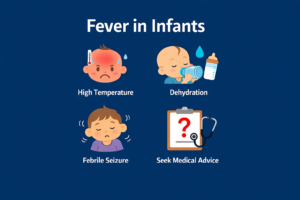Understanding Fever in Infants and Young Children
A fever is not an illness on its own — it’s a sign that the body is responding to an infection or another health concern. Mild to moderate fevers can play a role in helping the immune system manage viruses or bacteria.
First Aid & Workplace Relevance (Canada)
Parents, caregivers, and early childhood educators frequently encounter fevers in infants and young children. In Canada, child care settings, workplaces with family-support benefits, and community first aid training often highlight fever as a common reason for seeking assessment and support. Knowing how to observe symptoms, watch for dehydration, and respond calmly can help reduce stress and support early care decisions.
Scenario (Mild & Realistic)
A toddler at a home daycare became warm and more irritable than usual in the late afternoon. The caregiver noted a higher temperature and offered quiet play, fluids, and monitored for worsening symptoms. The parents were informed at pick-up, and the child recovered at home later that evening.
Symptoms of Fever in Infants

-
Warm or flushed skin
-
Irritability or tiredness
-
Faster breathing or heart rate
-
Reduced interest in feeding
-
Sweating or chills
Infants and very young children can spike higher temperatures than older children, particularly later in the day or evening.
Common Causes
Fevers may be triggered by:
-
Colds, influenza, and other respiratory infections
-
Sore throat
-
Urinary tract infections
-
Less commonly, conditions such as meningitis
Infants often have naturally higher temperatures and greater fluctuation across the day, especially during late afternoon and early evening.
Dehydration and Fever
One concern during fever is dehydration. Fever increases the body’s demand for fluids, and young children dehydrate more quickly.
Possible signs of dehydration in infants include:
-
Dry mouth or lips
-
Fewer wet diapers (e.g., dry diaper for several hours)
-
Dark or strong-smelling urine
-
Crying without tears
-
Lethargy or reduced energy
Offering frequent fluids can support hydration. Caregivers often rely on breast milk or formula for younger infants. Older infants may take small amounts of water in addition to regular feeds.
Febrile Seizures
Some children between 6 months and 5 years old may experience a febrile seizure when their temperature rises quickly. Febrile seizures can run in families and often occur within the first hours of an illness.
During a febrile seizure, a child may:
-
Stiffen or twitch
-
Roll their eyes
-
Have a brief period of unresponsiveness
These events are generally short and typically do not cause lasting harm. They should be reported to a health professional.
General First Aid & Care Considerations
Caregivers often:
-
Monitor behaviour and hydration
-
Help the child rest in a comfortable, quiet environment
-
Dress the child in light clothing
-
Monitor for persistent fever or concerning symptoms
Persistent fever or fever accompanied by unusual symptoms may warrant medical assessment to determine the underlying cause.
Prevention & Workplace Considerations
In childcare and family settings:
-
Hand hygiene and routine cleaning can help reduce common infections
-
Vaccination programs reduce risk of many fever-related illnesses
-
Workplaces that support flexible family leave help caregivers respond early and calmly to childhood illness
FAQ (Educational)
Is fever always a sign of serious illness?
Not necessarily. Many mild infections cause fever as part of the body’s response, though monitoring and supportive care are important.
Why do fevers tend to rise in the afternoon?
Body temperature naturally fluctuates throughout the day. In children, this rhythm can make fevers more noticeable later in the day.
Can hydration affect fever recovery?
Hydration supports comfort and helps offset fluid loss from fever. Infants may need more frequent feeding when febrile.
What are febrile seizures and who is most likely to have them?
Febrile seizures are brief seizures triggered by quickly rising temperatures, usually in children 6 months to 5 years old, and they often run in families.
When should persistent or unusual fever be assessed?
If fever continues or is accompanied by other concerning symptoms, health professionals can help determine the underlying cause.
Educational Note
This post is for general first aid learning and public awareness. Fever presentations vary, and caregivers may seek health assessment based on symptoms, persistence, or personal concerns.
